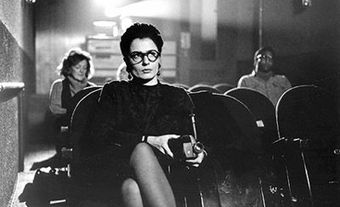This article was originally published in Maclean's Magazine on May 8, 1995
Rozema, Patricia (Profile)
With white paint peeling off its brick facade, the semidetached house on a quiet street near the cafés of Toronto's College Street looks as if it might be vacant. But with one thump from the knocker - a solid wooden shoe hinged to the front door - a hand suddenly pulls back a curtain and Patricia Rozema's face appears against a window in the door, staring in close-up like a face in a movie. Something by Ingmar Bergman. Laughing, Rozema opens the door and apologizes for giving her visitor a fright. "I just happened to be standing there," she says. The 36-year-old director, who has often been told that she looks more like a movie star than a moviemaker, is dressed in a black leather motorcycle jacket and a long velvet skirt. Entering the living room, she lifts a shaggy white dog from a leather chair and cradles him in her arms. "Meet Bob," she says, passing him over. The dog is shockingly limp, lifeless. As it turns out, Bob is a prop used for a dog's corpse in the director's new movie, When Night is Falling. Rozema's laughs again, her green eyes flashing mischief: she knows she has made an impression.
Rozema launched her career as a writer-director by making one of the most astounding first impressions in the history of Canadian cinema. With her precocious feature debut I've Heard the Mermaids Singing (1987), she became, at 28, Canada's first female film-maker to win serious international acclaim. The movie, a whimsical flight of fancy, cost just $350,000 but has grossed $6 million worldwide. Defying everyone's expectations, it helped reshape the agenda of Canada's publicly funded film industry - what if small, arty movies could actually make money? Rozema came crashing to earth with her second feature, the critically savaged White Room (1990). But with her third movie, which is out this week, she is breaking new ground once again: When Night is Falling may well be the most frankly erotic lesbian love story ever filmed for mainstream release.
It is not the first - Personal Best (1982), Lianna (1983) and Desert Hearts (1985) come to mind. But its scenes of sapphic seduction are unusually lavish. And they are filmed in a spirit of shameless romantic rapture that has no real precedent in movies about homosexuality. When Night is Falling may not restore Rozema's standing among her critics - its featherweight narrative unfolds with the mock naïveté of a Harlequin romance. But the movie has clear commercial potential. In competition at the Berlin International Film Festival in February, audiences voted it most popular film. And it has been sold to distributors in 40 countries, including the U.S.-based October Films, which plans to release it in 30 to 40 American cities in the fall.
Canadian movies are beginning to acquire something of a risqué reputation. For English-Canadian cinema, which has been so keenly devoted to introversion, sex offers a way out, a way to connect with an audience. Atom Egoyan's Exotica, now playing to rave reviews in the United States, is set in a striptease emporium. Eclipse, director Jeremy Podeswa's celebrated feature debut, unfolds as a daisy chain of sexual encounters, straight and gay. And now Rozema, a lapsed Calvinist raised by Dutch immigrants in Sarnia, Ont., joins the fray. She recently attended a festival in London, and says that people kept asking her: "What is it with you Canadians and all these movies about sex?"
Sipping a beer on her back patio, the director admits she does not have the answer. "There's certainly no conscious group effort to do this," she says. "But I sometimes think we're in a state of adolescence as a film industry, and adolescents are often obsessed with sex. The accusation that Canada is bland has sunk in. And this desire to be adult, to be contemporary and edgy, is part of our thinking now."
Mermaids and White Room were both self-conscious fables about the creative process - about fraud, sincerity and the artist's fear of being exposed. With When Night is Falling, Rozema has dropped the postmodern mask and - at the risk of exposing herself to embarrassment - made an unalloyed romance. The story is a simple triangle involving an academic (Pascale Bussières) who betrays her theologian boyfriend (Henry Czerny) by running off with a circus performer (Rachael Crawford).
The archetypes ring as loud and clear as church bells: religious repression versus bohemian freedom. "It's slightly tongue-in-cheek," says Rozema. "It's a classical romance. I wanted to use all the old conventions with one key twist. Since this subject isn't completely palatable, I wanted to make everything around it warm and easy to digest, as sensual as can be, admit in every frame that it's about pleasure."
For Rozema, When Night is Falling represents a kind of coming out. She had wanted to make a lesbian romance for some time, she says, "but earlier in my career, I didn't want to be known as 'that lesbian film-maker." Even now, she remains wary of being typecast. "With this film, I'm introducing the subject of sexual preference," she says, "but I'm still uneasy about discussing mine publicly. I guess I would have called myself bi six or seven years ago. I don't know. There are a lot of delightful men in the world. But I'm gradually coming to the conclusion that I'm primarily lesbian." Declining to talk about the current state of her love life, she adds: "I hate to be labelled. I refuse to have anything ruled out - I want to keep all my options for the future open."
Meanwhile, she is still coming to terms with her past. One of three children, she was born in Kingston, Ont., then moved to Sarnia a year later, where she grew up in a strict Calvinist enclave. "All my friends' parents had Dutch accents," she recalls. "If someone was going out with someone outside the Church, it was with 'a Canadian boy.' " Her father, John Rozema, and her mother, Jacoba (who died two years ago), moved to Canada after the Second World War and became successful real estate entrepreneurs. They were devout members of the Christian Reformed Church, but more open-minded than other Calvinist parents, Rozema recalls. "We were one of the families that could swim on Sundays. Most families couldn't drive on Sundays. We could."
Movies were not a big part of growing up. She did not see a movie, aside from Snow White, until she was 16. It was The Exorcist. "I sort of understood why movies were frowned upon then," she laughs. "I was horrified. I was on a date with a Canadian boy, and I remember driving home and seeing eyes in the headlights of the car. Even now, I have no problem with violence in movies, but if it's supernatural evil - Dracula - that can scare me. I just believed in the Devil for too long."
Rozema began to question her faith while studying philosophy at Calvin College, a small liberal arts university in Grand Rapids, Mich. "The concept of evil - that God created evil and God is good - just drove me nuts," she recalls. "I remember writing a paper titled 'Why I am not a Christian,' and I broke into a sweat as I wrote those words. I knew I had attractions to the wrong people, to women as well as men, and there was no place for that in that world." At Calvin, Rozema had a dizzying two-year romance with a philosophy professor. And the setting of her new film, whose heroine is torn between her Christian theology and sexual freedom, is loosely based on her alma mater.
The director recalls an incident involving a Calvin alumnus, film-maker Paul Schrader. When she was a student there, Schrader, famous for writing Taxi Driver (1976), was invited to speak. Rozema was editor of the same campus newspaper, Chimes, that Schrader had edited. After his speech, they went out for a beer, and she asked him to donate to a spoof issue of the paper. Schrader signed over his speaker's honorarium of $250. Then, Rozema recalls, she and her friends joined him for a party at his hotel. "It was the first time I ever tried coke," she says, adding that she declined a bantering invitation from Schrader to sleep with him. The next morning, before he left town, they met briefly at the Chimes office. "Three days later I get called into the chaplin's office," says Rozema. "He said I'd been seen with Paul Schrader late at night and early in the morning - is it true that I'd slept with him for $250?" (Not coincidentally, the characters of When Night is Falling include a censorious college chaplin.)
Graduating in 1981, Rozema pursued a career in journalism, landing an associate producer job at CBC-TV's The Journal in Toronto. There, the late broadcaster Barbara Frum became a "major mentor," she says. But Rozema found journalism too restricting. "I had a burning desire to tell people what to say so it would be more affecting," she confesses. "Most injustices in journalism come from an attempt to imitate the structures of fiction."
Changing careers, Rozema took a five-week course in film production. In 1985, she made an award-winning short, Passion: A Letter in 16 mm. Then, while working as an assistant director on various productions, including David Cronenberg's The Fly, she wrote Mermaids. Despite skeptical reactions from federal and provincial funding agencies, she and her novice co-producer, Alexandra Raffé, scraped together the budget. At the 1987 Cannes Film Festival, Mermaids received a delirious 10-minute standing ovation.
The movie featured a stellar performance by Sheila McCarthy as a Chaplinesque dreamer named Polly - an aspiring photographer, she works for a lesbian curator at a gallery housed in a former church. In Mermaids, Rozema introduced personal themes that set the tone for her work ever since: deception in religion and art, sexual voyeurism, closeted desire - and the dream of defying gravity.
Mermaids is threaded with fantasies that show McCarthy flying, walking on water, scaling a high-rise with suction cups - and falling. When Night Is Falling dramatizes romantic risk with a scene of the two women hang gliding. "All forms of flight thrill me," says Rozema, who has tried hang gliding herself. "I adore height. My father built apartment buildings and I remember sitting at the top, dangling my legs, just loving it. I'm attracted to all forms of danger."
Film-making, of course, carries its own risks. The critical attacks on White Room, which starred Kate Nelligan as a mysterious recluse, "broke my heart," says Rozema. "Especially in Canada, the reaction was very negative. It was very hard for me. I kept saying, 'I'm not strong enough. I have to find another job."
There is an openness to Rozema's work that leaves her vulnerable to the charge of flakiness. Her symbols and metaphors lie exposed on the surface of her films, as plain as day. Unlike Egoyan's films, darkly disturbing dramas that implode in the viewer's mind, her stories unfold as a series of bright, modest epiphanies.
She seems especially sensitive to her actors. "Patricia is quite a great spirit on the set," says her producer and longtime collaborator, Barbara Tranter. "She's much more interested in the actors than the technical stuff." Of her experience acting in When Night is Falling, Rachael Crawford says, "It was the first time I ever worked on anything where I felt I was on an equal level. There was lots of input asked for and allowed." The movie's sex scenes were especially effortless, according to everyone involved. "We were all a little nervous at first," says the director. "But a little Scotch, music on in the background ... it was a really organic thing."
As a film-maker, Rozema is striving for a particular kind of intimacy. "We all have the desire to see people in their natural state, when they're not performing for you. When you're just walking by at twilight before people have closed their curtains, and you see them talking to each other - I love it." Adds Rozema: "We want untainted reality."
Back in her kitchen, Rozema points to some snapshots of friends stuck to her fridge. Among them is a fan letter from neo-feminist firebrand Camille Paglia. Rozema says she has mixed feelings about Paglia's ideas, especially her theory that AIDS is nature's punishment for gay promiscuity. But she seems bemused by the attention. In the two-page note, a manic scrawl riddled with exclamation marks, the American author says Mermaids is "a standard text chez Paglia." She writes: "My lover, the artist and curator Alison Maddex (28 years old; arrived in my life a year and a half ago to end my awful Decade of Drought), has been mystically convinced for many, many years that you and she are destined to be collaborators on future projects!!" Paglia goes on to say that she and her lover recite entire passages from Mermaids to each other - "I love the humor of the film, especially those awkward moments of people entering rooms or exchanging embarrassed glances."
From Barbara Frum to Camille Paglia - in her war on gravity, Patricia Rozema seems to be gaining ground.
Maclean's May 8, 1995

 Share on Facebook
Share on Facebook Share on X
Share on X Share by Email
Share by Email Share on Google Classroom
Share on Google Classroom




